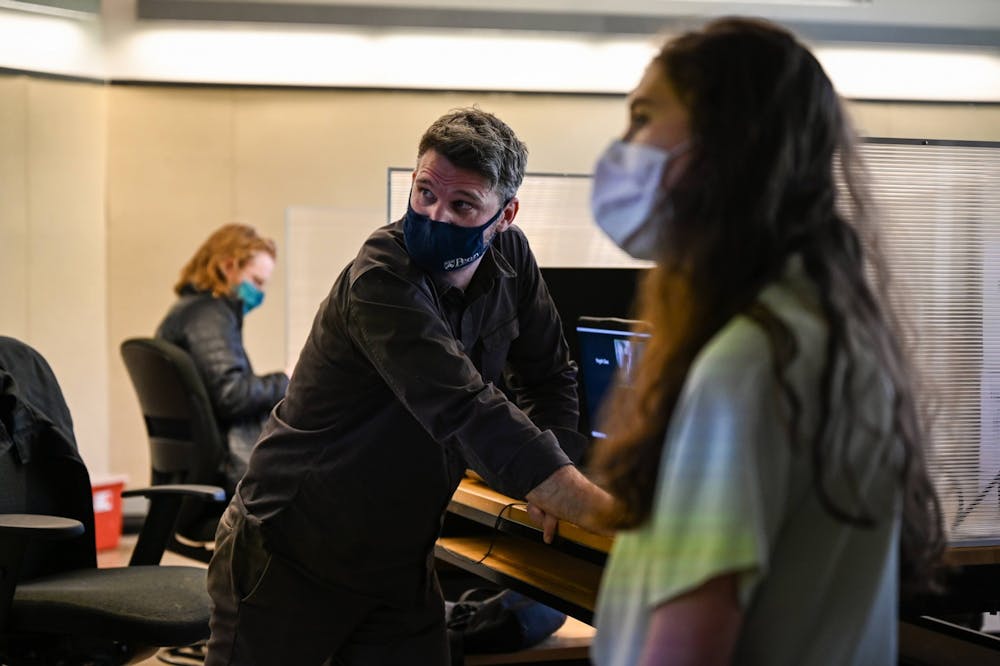
On March 15, Penn announced that masking is now optional in indoor public spaces on campus, while masking in classrooms continues to be required until March 28.
Credit: Kylie CooperThe Penn community voiced mixed feelings about the University’s changing COVID-19 policies, citing concerns about transmission of the virus in classrooms and fears of new and highly contagious variants.
On March 15, Penn announced that masking is now optional in indoor public spaces on campus, while masking in classrooms continues to be required until March 28. The University also removed its COVID-19 testing requirements for fully vaccinated individuals.
While some students are excited about a return to normalcy and have embraced the move away from masking, other students still have concerns for at-risk populations who are much more vulnerable to infection.
College sophomore Ellie McKeown, who is immunocompromised, said she is very worried about the classroom mask mandate being lifted on March 28. She explained that she believes lifting the mask mandate in classrooms would highly increase her risk of infection.
“It’s a grievous injustice to all immunocompromised people, or people that are caring for the elderly or young,” McKeown said. “I think in the first place, the mask mandate should not have been lifted.”
McKeown said she thinks the University should allow professors and teaching assistants to institute their own mask mandates and that disabled students should have the right to go fully virtual learning through Disability Services.
“The only thing standing between me and the risk of hospitalization and, even in some circumstances possibly death, was the mask mandate,” McKeown said.
She added that she has communicated to her professors and the University that she must receive virtual accommodation. Most professors, McKeown said, have been understanding in accommodating her needs, providing online recordings for lectures and allowing her to submit in-class assignments online.
Other students were more optimistic in embracing the lifting of COVID-19 restrictions.
“Overall, I really appreciate the move towards normalcy," College sophomore Alexandra Shank said. “I especially appreciate being able to go to Pottruck and not having to work out in a mask."
Shank added, however, that she was worried about a possible resurgence in cases. Scientists are currently monitoring the new and highly transmissible BA.2 subvariant of the Omicron variant.
“I worry about the subvariant. My opinion is, while rates are low, we might as well enjoy a return to normalcy as much as possible,” Shank said. “I currently don’t see any danger in getting rid of the mask mandate, and I’d like to take advantage of it while we can.”
Wharton junior and 2023 Class Board President Derek Nhieu stated that he has “very mixed feelings." The removal of the mask mandate came just days after school resumed following spring break, which Nhieu said he found surprising.
“For me, I’m more on the cautious side,” he said. “But I think it is nice for the people who, you know, wanted more of a return to normalcy.”
Nhieu added that he thinks professors should be given the option to teach classes online if they are concerned about catching the virus.
Professor of English and President of the Penn chapter of the American Association of University Professors Chi-ming Yang wrote in an email to The Daily Pennsylvanian that she was concerned about the effects of lifting the mask mandate on vulnerable populations.
“All instructors should have the right to request masking in their own classrooms,” Yang wrote.
On March 16, AAUP–Penn released a statement to University administrators in response to the new COVID-19 guidelines which asked administrators a series of questions, including whether professors could institute their own masking guidelines and the possibility of offering online instruction.
“We ask that the University send a clear message to students that instructors are allowed to set their own classroom guidelines regarding mask-wearing,” Yang wrote.
Gwendolyn Beetham, the associate director of Penn’s program in Gender, Sexuality, and Women’s Studies, said that she is “personally concerned, because [she is] the parent of a child who is not able to be vaccinated yet.”
Beetham echoed AAUP–Penn's statement, saying that the University needs to clarify whether professors can require masking in their classes to protect themselves and vulnerable populations.
“I think we want to make [in-person learning] as accessible to every single person that is in that space," Beetham said.
The Daily Pennsylvanian is an independent, student-run newspaper. Please consider making a donation to support the coverage that shapes the University. Your generosity ensures a future of strong journalism at Penn.
Donate







